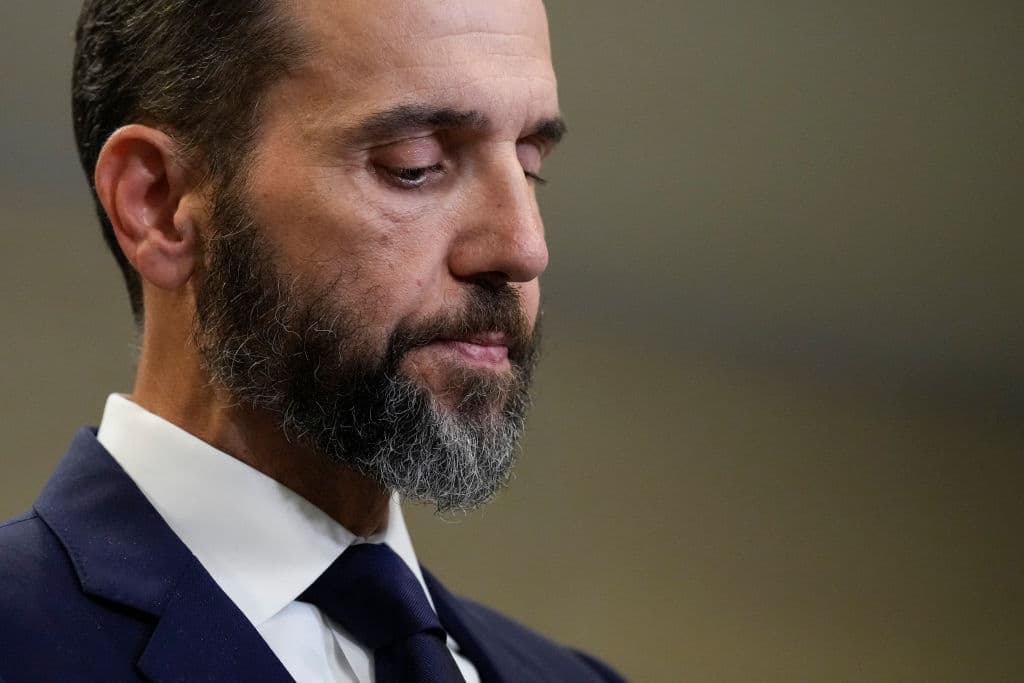Smith Likens Trump to Nixon, Accuses Him of Trying To Free Presidents From Laws Against ‘Murder, Treason, and Sedition’
The special counsel tells the Supreme Court that a ‘president’s constitutional duty to take care that the laws be faithfully executed does not entail a general right to violate them.’

Special Counsel Jack Smith’s accusation that President Trump’s vision of immunity would, if ratified by the Supreme Court, usher in a “regime that would have been anathema to the Framers” underscores the stakes of the 45th president’s petition.
Mr. Smith’s 66-page brief, his main submission, argues that a “former President lacks absolute immunity from federal criminal prosecution for conduct involving his official acts.” Mr. Trump contends that the constitutional concept of the presidency protects him from prosecution for attempting to undo the 2020 election. That argument has been rebuffed at the district and appellate levels.
Now the special counsel’s office, in advance of oral arguments on the immunity issue set for April 25, argues that the 45th president proposes a “novel and sweeping immunity from the federal criminal laws that govern all citizens’ conduct.” The prosecutor adds that the “President’s constitutional duty to take care that the laws be faithfully executed does not entail a general right to violate them.”
Mr. Trump argues that the lack of criminal prosecution of a president before himself points to Mr. Smith’s deviancy. The special counsel, though, writes that the “Framers never endorsed criminal immunity for a former President, and all Presidents from the Founding to the modern era have known that after leaving office they faced potential criminal liability.” Mr. Trump’s case is frozen pending a Supreme Court ruling on immunity.
Mr. Smith reckons that the “closest historical analogue” to Mr. Trump’s behavior in the aftermath of the 2020 election is “President Nixon’s official conduct in Watergate, and his acceptance of a pardon implied his and President Ford’s recognition that a former President was subject to prosecution.”
Mr. Trump’s strongest precedent, though, also relates to the 37th president. In Nixon v. Fitzgerald, the high court recognized in civil cases “absolute Presidential immunity from damages liability for acts within the ‘outer perimeter’ of his official responsibility.” Mr. Smith asserts that his case “involves the far weightier interest in vindicating federal criminal law.”
It is not difficult to imagine some justices treating with skepticism Mr. Smith’s claim that “layered safeguards provide assurance that … no President need be chilled in fulfilling his responsibilities by the understanding that he is subject to prosecution.” That reassurance is his response to Mr. Trump’s worry that a meager measure of immunity will result in a proliferation of prosecutions.
Mr. Smith reassures the court that these “strong institutional checks to ensure evenhanded and impartial enforcement of the law” comprise grand and petit jury proceedings, the presumption of innocence, and “due process protections to guard against politically motivated prosecutions.” Mr. Trump argues that those guardrails are more honored in the breach than the observance.
The special counsel conjures for the Nine the baleful consequences that would ensue should the justices side with Mr. Trump’s proposed immunity doctrine. Mr. Smith characterizes that as a “radical suggestion, which would free the President from virtually all criminal law—even crimes such as bribery, murder, treason, and sedition.” Not mentioned is insurrection, of which Mr. Trump was acquitted by the Senate during his second impeachment trial.
That verdict is, Mr. Trump argues, another source of immunity. The Constiution’s Impeachment Judgment Clause ordains that “the Party convicted shall nevertheless be liable and subject to Indictment, Trial, Judgment and Punishment, according to Law.” The former president reads “convicted” to mean that a “not guilty” outcome like the one he secured is a bar to a double prosecution.
Mr. Smith calls impeachment “an inherently political process, not intended to provide accountability under the ordinary course of the law.” He contrasts impeachment with criminal prosecution, which “is based on facts and law, and is rigorously adjudicated in court.” The prosecutor observes that even under Mr. Trump’s analysis, immunity for a former president would not be absolute if he had been judged guilty by the Senate.
Mr. Trump’s robust vision of immunity flows from his expansive vision of what amounts to an “official act” deserving of that umbrella of protection. He asserts that his actions in the wake of the 2020 election — including his speech at the Ellipse — were consistent with the Constitution’s provision that the president “shall take Care that the Laws be faithfully executed.”

